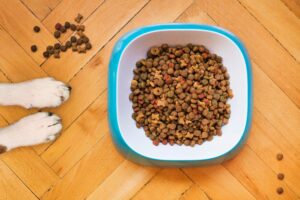The Best Diet for Your Dog – The Best Dog Food
We get this question often from dog owners – what should I feed my dog? What’s the best dog food? What type of diet is healthiest? There are thousands of pet food brands and flavors, with hundreds of options for ingredients. We’ll help you sort through them!
The Very Best Dog Food for Your Dog
We’ve learned over the years that the best diet is a well-planned, nutritionally balanced raw diet. IF you have the time, interest in becoming educated, and money, raw is the way to go! There are tons of resources online that you should use to educate yourself to make sure you’re offering a raw diet that is nutritionally sound – your dog will thank you for it! There are also commercially available raw food diets on the market.
The Most Realistic Diet for Your Dog
The next best way to feed your dog, and most realistic for many of us is this:
Feed the highest quality commercial food you can get, and supplement it with fresh meats, fruits and vegetables.
This may be a dry dog food formula, a dehydrated option, or a canned or wet dog food product.
Finding High Quality Dog Food
How do you find the best quality dog food? We use the ranking system from Dog Food Advisor and recommend a 4 or 5-star brand OR the highest rating you can afford. You can use this site to find high quality brands available to you locally, and they rate dry food, wet food, raw food and canned food. If you shop online, a number of retailers will mail them right to your door.
Use a formula specific to your dog’s age. Nearly all brands have adult dog and puppy formulas.
If your dog has specific ingredients you need to avoid, we recommend PawDiet.com’s Food Finder tool to search food brands and formulas by the ingredient list. You can select specific ingredients to include or avoid, the star rating, your budget, and it gives you back a list of brand and flavor options to choose from.
Supplementing with Fresh Food
We recommend supplementing your dog’s high quality dog food with fresh meats, fruits and vegetables when you can! To maintain a healthy weight, remove a portion of regular dog food from the meal when you add fresh foods in.
Eggs and raw meats are an excellent source of protein and other nutrients. Avoid an excessive amount of pork, and never give bones that have been cooked. Raw bones from chickens, turkeys, or ribs of larger animals (non-load bearing bones) are nutritious and can help keep teeth clean. They won’t splinter into sharp pieces like cooked bones. When possible, avoid ground meat, which can carry more bacteria than whole pieces.
Fresh, in-season fruits and vegetables provide a great source of vitamins and minerals! Most dogs love apples (not the seeds), bananas, berries, sweet potatoes, squash, green beans, carrots and many other human snacks! These are best fed raw or lightly steamed to retain nutrients.
Avoid these foods that are toxic to dogs:
- Garlic
- Avocado
- Yeast
- Chocolate
- Rhubarb
- Citrus fruits and oil
- Macadamia Nuts
- Grapes and raisins
- Xylitol (sugar alternative found in some peanut butters, baked sweets, candy and chewing gum)
- Wild mushrooms
- Apple seeds
- Black walnuts
- Cinnamon
- Nutmeg
- Peach pits
- Alcohol
- Leeks
- Mustard
- Coffee
- Cherries
- Onion
- Chives
- Green tomatoes
- Green potatoes or potato sprouts
We supplement our pack’s food with a homemade beef broth poured on their food. Because we have a range of allergies, we have to control the ingredients and making it ourselves is the easiest solution! We simply boil raw beef bones in the slow cooker for 12+ hours, let it cool, throw the bones in the trash and pour the broth in mason jars to use for the week. It’s a great way to add extra nutrients for a pretty low cost.
A raw egg every day or every other day can add a tremendous amount of nutrients to your dog’s diet as well. Commerical dog foods start to lose some of their essential nutrients as soon as they’re manufactured, and by the time they reach your dog’s bowl months may have passed. A raw egg puts fresh nutrients back into the bowl that will have decayed out over time.
A Note About Grain-Free Diets
Should you feed grain-free dog food? There are a lot of differing opinions on grains, but the prevailing advice is to leave grains in your dog’s diet unless they have a specific allergy to them. Always consult a trusted veterinarian or canine nutritionist when you have questions.
A Note About Allergies
Allergies (or allergic reactions to things a dog isn’t necessarily allergic to) can appear when your dog’s gut health isn’t optimal. More than once I’ve started one of my dogs on a good quality probiotic and found out their gut health was playing a bigger role in their overall health than I thought! This is the probiotic I give my pack, but your vet may recommend one as well!
If you try a probiotic for a period of 1-2 months and still notice chronic skin, coat, ear or stomach concerns with your dog, consider asking your vet for allergy testing. You can attempt to determine if your dog has allergies by process of elimination, but it’s a long, time-consuming process that you might not get right in the end! Feeding food and treats containing ingredients your dog is allergic to can cause short and long-term health issues.
Dogs With Medical Conditions
If you have a dog or puppy with existing medical conditions, always consult a trusted vet or canine nutritionist before making a dramatic change to their diet. Get a second opinion as often as possible! Veterinarians are like human doctors – they can offer differing advice based on their training and experience!
Why Use the Best Dog Food for Your Dog?
A dog’s diet can impact every aspect of their health and wellness, even behavior. A dog that has a healthy diet is no different than a person eating a healthy diet – we’re happier, more balanced, have fewer health concerns, and longer life spans. Feeding a low-quality food to a puppy can cause a similar reaction to giving sugar to a toddler – a host of behavior concerns can come from it. Choose the food that’s right for your dog and you’ll see short and long-term changes in their overall health and wellness!
Do you have a new puppy and want to start them off on the best foot? We can help with a Puppy Consultation to talk about the best treats to use, basic commands to work on, how to properly socialize and build confidence in your puppy and where to go next with training! Older dog? It’s never too late to start a healthy diet and lifestyle, and it’s never too late to teach an old dog new tricks!





